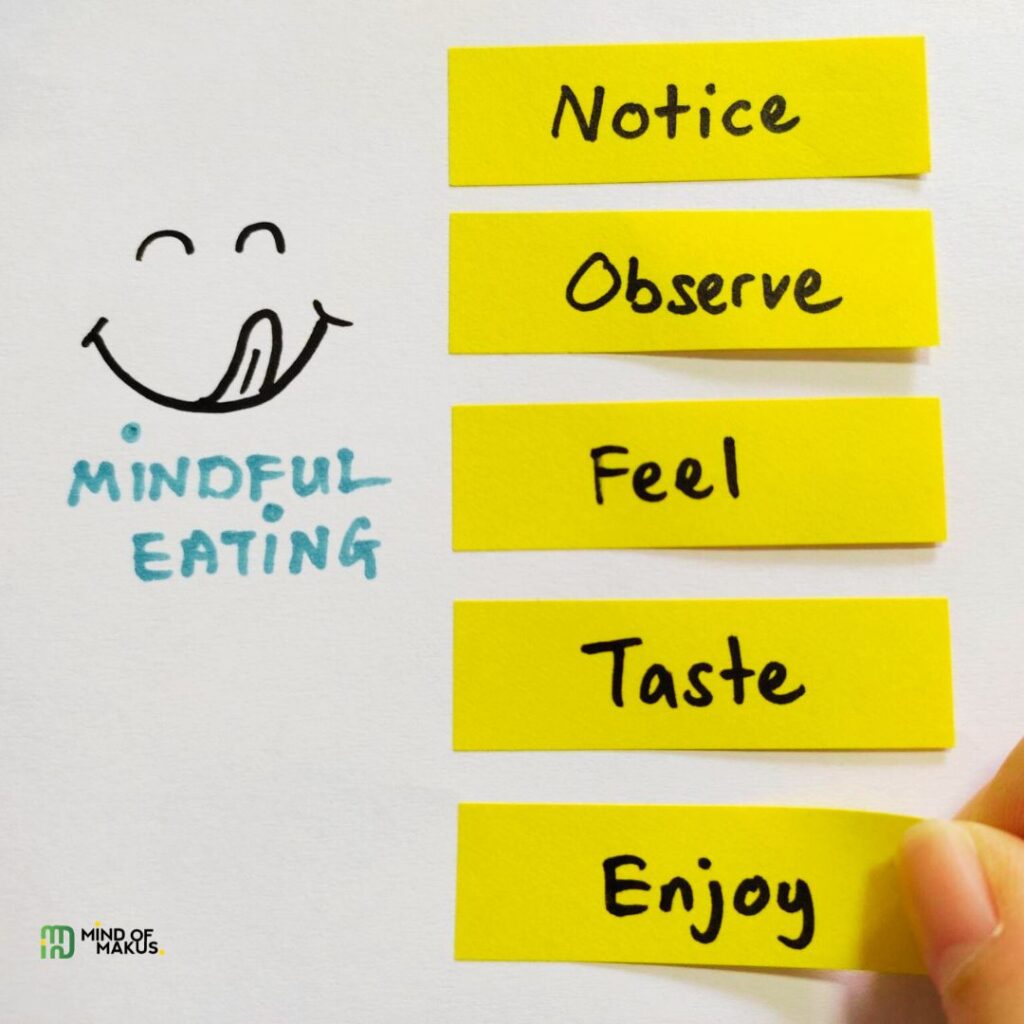Hi, and welcome to this week’s post.
If your week has been just like mine, then I can assume your are planning to cool off this weekend after such a busy week. I hope you dressed in your favorite way this week. Check out my post on fashion as a tool for your self-care.
During a busy day or week, we often find it hard to get a enough time to breath and even eat. That is why I have decided to write on Mindful Eating.
Mindful eating is a powerful practice that can transform your relationship with food and boost your self-confidence. In today’s fast-paced world, we often find ourselves multitasking while eating, which can lead to mindless overeating and unhealthy food choices.
However, by practicing mindful eating, you can bring your attention back to the present moment, cultivate a deeper connection with your body, and make more conscious choices about what and how much you eat.
What is Mindful Eating?
Mindful eating is a type of mindfulness exercise that focuses on the experience of eating rather than the food itself. It involves paying full attention to the sensations, thoughts, and emotions that arise during a meal.
By practicing mindful eating, you can become more aware of your body’s hunger and fullness cues, identify emotional triggers for overeating, and develop a greater appreciation for the nourishment and pleasure that food provides.
According to researchers,, mindful eating involves eating slower and more deliberately, avoiding distractions like television and smartphones, listening to your body’s hunger and fullness signals, choosing foods that are both satisfying and nourishing, and being mindful of your response to different foods.
Benefits of Mindful Eating
Practicing mindful eating offers a range of benefits for both your physical and mental well-being. Here are three key benefits:
- Better Digestion: Being mindful of the food you eat can promote better digestion by allowing your body to properly process and absorb nutrients. By eating slowly and chewing thoroughly, you can support optimal digestion and nutrient absorption, which can contribute to overall health and well-being.
- Healthy Weight Management: Mindful eating can help you maintain a healthy weight by increasing your awareness of hunger and fullness cues. By paying attention to your body’s signals, you can avoid overeating and make more mindful choices about portion sizes and food selection.
- Emotional Freedom: Mindful eating can help you free yourself from unhealthy habits and emotional attachments to food. By becoming more aware of the emotions and triggers that lead to mindless eating, you can develop healthier coping mechanisms and create a more balanced relationship with food.


Understanding Unhealthy Eating Behaviors
Before diving into the practical steps of mindful eating, it’s important to understand some common unhealthy eating behaviors that can hinder our ability to eat mindfully. Two key behaviors are:
Emotional Eating
Emotional eating refers to using food as a way to cope with or suppress emotions. When we eat in response to stress, boredom, sadness, or other emotions, we often turn to high-calorie, comfort foods that provide temporary relief but can lead to feelings of guilt and overeating. Emotional eating can become a cycle that reinforces negative emotions and undermines our efforts to practice mindful eating.
External Eating
External eating is the tendency to eat in response to external cues, such as the sight or smell of food, social situations, or the availability of food. When we eat mindlessly in response to these cues, we may consume more food than our bodies actually need. External eating can lead to overeating and difficulties in recognizing and responding to our body’s hunger and fullness signals.
How to Practice Mindful Eating
Now that we understand the concept of mindful eating and the challenges that can hinder our progress, let’s explore six practical strategies that can help promote mindful eating:
1) Let Your Body Catch Up to Your Brain
One key aspect of mindful eating is giving your body time to catch up to your brain. It takes approximately 20 minutes for the brain to register that you’re full. By eating slowly and savoring each bite, you can allow your body to send the appropriate signals of fullness, preventing overeating. Take breaks between bites, chew your food thoroughly, and pay attention to the flavors and textures. This allows you to fully experience the pleasure of eating and promotes a sense of satisfaction.
2) Know Your Body’s Personal Hunger Signals
Each person’s body has unique hunger and fullness cues. By becoming more aware of your personal signals, you can better respond to your body’s needs. Pay attention to physical sensations like stomach grumbling, decreased energy, or light-headedness as signs of hunger. Similarly, notice feelings of satisfaction, a comfortably full stomach, and reduced interest in food as signs of fullness. By honoring these signals, you can nourish your body appropriately and avoid overeating.
3) Cultivate a Mindful Kitchen for Mindful Eating
Your kitchen environment plays a significant role in supporting mindful eating. Create a space that promotes healthy food choices and mindful eating practices. Keep your kitchen stocked with nutritious foods that you enjoy and that align with your health goals. Remove or minimize the presence of unhealthy, processed foods that can trigger mindless eating. Set aside dedicated time and space for meals, free from distractions like television or smartphones. By creating a mindful kitchen, you can set the stage for a more mindful eating experience.
4) Understand Your Motivations
Take a moment before each meal to consider your motivations for eating. Ask yourself if you’re truly hungry or if you’re seeking comfort, distraction, or a way to cope with emotions. By identifying the reasons behind your desire to eat, you can make more conscious decisions and choose healthier ways to satisfy your emotional needs when appropriate.
5) Connect More Deeply with Your Food
Mindful eating encourages a Benefits of Mindful Eating
Mindful eating is a practice that offers numerous benefits for individuals seeking to develop a healthier relationship with food and improve their overall well-being. By incorporating mindful eating into your daily routine, you can experience the following advantages:
1. Improved Food Choices: When you engage in mindful eating, you become more attuned to your body’s signals and cravings. This awareness allows you to make better food choices based on what your body truly needs, rather than relying on external cues or emotional triggers.
2. Enhanced Digestion: Mindful eating encourages you to slow down and fully experience each bite of food. By chewing slowly and savoring the flavors, you give your digestive system ample time to process the food, leading to improved digestion and nutrient absorption.
3. Weight Management: Mindful eating promotes a balanced approach to food, helping you develop a healthier relationship with eating and reduce overeating. By paying attention to your body’s hunger and fullness cues, you can better manage portion sizes and prevent mindless snacking, which may contribute to weight loss or maintenance.
4. Increased Satisfaction: By giving your full attention to the act of eating, you can truly savor and enjoy your meals. This heightened sensory experience leads to increased satisfaction and enjoyment from your food, resulting in a more fulfilling and pleasurable eating experience.
5. Emotional Well-being: Mindful eating encourages you to be present and non-judgmental while eating. This practice can help you develop a greater sense of self-awareness and emotional regulation, reducing stress and emotional eating tendencies.
6. Body Awareness: Engaging in mindful eating allows you to cultivate a deeper connection with your body. By tuning in to physical sensations, such as hunger, fullness, and satisfaction, you can develop a better understanding of your body’s needs and foster a more intuitive approach to eating.
7. Overall Health and Wellness: Mindful eating has been associated with various health benefits, including improved blood sugar control, reduced risk of chronic diseases, and better overall nutritional status. By practicing mindful eating, you can support your body’s well-being and promote a more balanced and nourishing approach to food.
Incorporating these benefits into your daily life may take time and practice, but by cultivating a mindful eating lifestyle, you can create lasting habits that positively impact your relationship with food and overall health. Remember to be patient with yourself as you embark on this journey towards mindful eating.deeper connection with the food you consume.
Consider where your food comes from, how it was grown or produced, and the journey it took to arrive on your plate. Acknowledge the effort and resources that went into creating your meal and express gratitude for the nourishment it provides. By connecting with your food in this way, you can cultivate a sense of appreciation and respect for the sustenance it offers.
Acknowledge the effort and resources that went into creating your meal and express gratitude for the nourishment it provides
-Mind of Makus
6) Attend to Your Plate
When eating, focus your attention on the food in front of you. Notice the colors, textures, and aromas, as well as the taste and mouthfeel of each bite. Avoid multitasking or engaging in distractions like watching TV, browsing social media, or working. By giving your full attention to your meal, you can savor the experience, become more attuned to your body’s signals, and create a more enjoyable and satisfying eating experience.
Conclusion
Mindful eating is a powerful practice that can help you develop a healthier relationship with food, improve your overall well-being, and boost your self-confidence. By incorporating these six strategies into your daily routine, you can create lasting habits that promote mindful eating and support a more balanced, satisfying, and nourishing approach to food.
Remember, it takes time and practice to develop mindfulness skills, so be patient with yourself as you work towards cultivating a mindful eating lifestyle.
You are worth the work.
Stay wholesome
Stay authentic
Be yourself and keep getting better at it.
Live wholeheartedly,
Amaka



